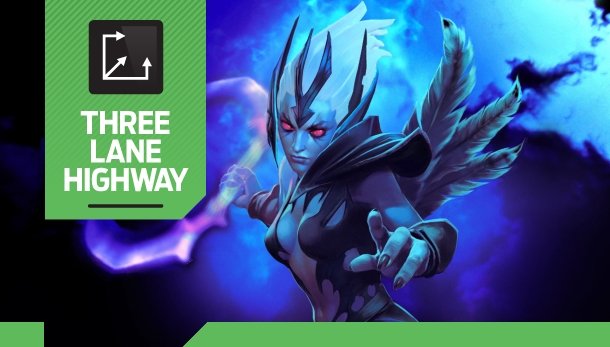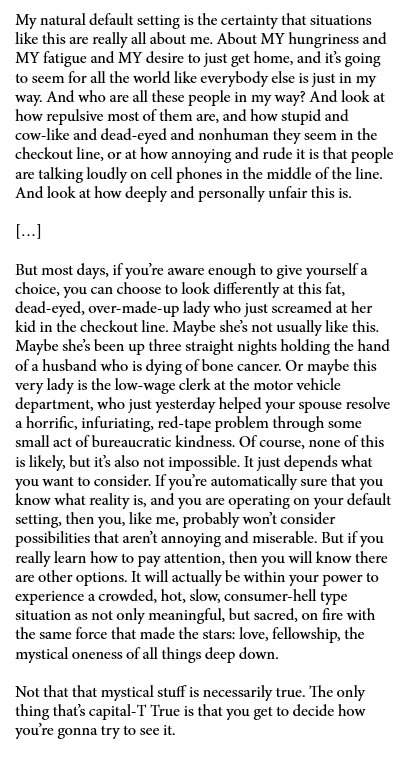Three Lane Highway Revisited: anger as failure, and other thoughts on empathy in Dota

Three Lane Highway is Chris' sometimes silly, sometimes earnest column about Dota 2. The following was originally posted on the Three Lane Highway Tumblr in September 2013 - we're republishing it today as Chris is currently on a plane somewhere over the Atlantic. Enjoy!
In 2005 the late David Foster Wallace gave a commencement speech to graduates at Kenyon College, Ohio. I'm going to quote a few paragraphs of it below, but before I do I want to lay out why it is relevant to you, a person who presumably came here to read about Dota.
The majority of the things you need to learn to be good at Dota are not things that will make you good at real life. You are probably never going to land a sick Sacred Arrow on a fleeing mugger. You won't place wards at strategic locations around your cubicle to let you know when you should be alt-tabbing away from Reddit. You're not going to invest an unexpected tax return - sensible as it might seem to do so - in a courier upgrade and the first parts of a Mekansm.
But game knowledge isn't the sum of what makes a person - or a team - successful. There's another skill ladder that every player needs to climb, and its rungs are the principles of empathy, leadership, and mood-management that are broadly ignored, from time to time, by everybody, and that if performed well indicate that you're making some progress as an actual human being in addition to improving your wizardsmanship.
Dealing with abuse from other players is something that newcomers need to deal with, but learning not to become an abuser is just as important. Dota is an emotive, social game, and anger and frustration and the urge to blame are inevitable by-products of playing it. Improving means learning to see anger and frustration for what they are - hindrances - and developing strategies for dealing with them. Indulging in rage because you feel bad is as detrimental to your team as not buying wards because you can't be bothered.
The reason that most players don't bother to filter their emotions is simple: it's hard, and it requires constant work. Everybody slips up, even people who spend a lot of time thinking about this stuff. The funny thing about learning to see anger as a personal failure is it makes you more aware of just how many mistakes you really make. Your skill doesn't improve in a straight line: it's a sinusoidal wave, and when you learn to forgive yourself for the odd lapse of judgement you'll naturally become more able to extend this sympathy to others. It's a virtuous cycle, equivalent to the vicious cycle that makes players rage at their teammates, wreck morale, throw the match, rage at their team mates, and so on, and so on.
It helps to establish rules for yourself. Structured thinking allows you to readily find a response to a crisis when what you really want to do is yell at someone. What form those rules take is something that you'll have to figure out for yourself, based on the level you play at, the people you play with, and your own bad habits. For the sake of demonstration, however, here are mine.
The biggest gaming news, reviews and hardware deals
Keep up to date with the most important stories and the best deals, as picked by the PC Gamer team.
Never begin a sentence with 'why', or frame criticism as a question.
Consider the absurdity of yelling “why would you do that?!” at somebody who just made a mistake. They don't have an answer. If they knew enough to avoid making a mistake, they wouldn't have made a mistake. It's far more likely that they misclicked, or weren't aware of something crucial - an imminent enemy TP, an ult on cooldown, a ganker suddenly going missing from another lane. In that moment you can either try to understand their mistake or you can interrogate them about it to make yourself feel better: I suggest the former. “Why would you do that!?” is rhetorical flatulence, and it's completely appropriate to roll your eyes at people who noisily indulge themselves in it.
Talk about what you need to do, not what you should have done.
Lectures aren't solutions. The time to explain ideal teamfight strategies or item builds is later, after the game, if you play regularly enough with your teammates to make that worthwhile. In-game, suggest simple, next-five-minute plans and do so calmly. “Okay, guys, let's focus on getting BKBs up” beats “why the fuck don't you have a BKB? It's core before X, and Y, and Z” every single time.
Offer as much praise as criticism.
Okay, it's going to shit. The match is running long and your team's early-and-mid-game advantage is starting to peter out. It's clear that Spectre doesn't know what they're doing - a Vanguard and a Crystalys at forty minutes, really? - and the enemy has just slapped a Roshan attempt out of your hands with a solid teamfight victory. It's time to find another plan, and that probably means asking people to correct their play. Tell Spectre to go and farm, if you need to, but mark that in your mind as a negative strike against team morale - and start looking for a positive to match it with.
Maybe you pick up a few free kills on an enemy support because of Jakiro's excellent aggressive warding. Say something! It might not turn the game around, but it makes a difference. It establishes that it is still possible to do good when most players will be reaching for the 'FF' keys.
We think of Dota matches as being won on economic momentum - gold, kills, towers - but they're also won on psychological momentum. If you burn a load of goodwill by putting someone down, start figuring out how you're going to earn it back.
Be honest about your mistakes, learn from them, and move on.
This is the one I struggle with the most. Being forthright when you've fucked up is great for a number of reasons. It establishes that you're actively thinking about your play, that you're willing to improve, and it defangs other peoples' ability to pin the entire match on your failure. What comes next is continuing to play as if it didn't happen, making whatever adjustments you need to make and then choosing to think of the game ahead as winnable. “I'm sorry, guys, I'm having the worst game ever” is as much a self-serving indulgence as “what the hell are you doing?!”, really.
Figuring this stuff out is one of the coolest things about learning to play Dota. Not only is it transferable to everything else you'll do in life, but it hooks into philosophical principles that apply to the game's mechanics as well. The principles I've listed above require engagement, awareness, and an active choice to play better. The social challenge of Dota requires a separate but parallel set of skills, another form of game-sense that allows you to take everything your brain can do with regards to perception and analysis and communication and apply it to more effectively wizarding the fuck out of five other people.
Next time you bash out 'FFS' and ping a teammate's recent corpse fifteen times, consider that you're not only throwing the game but your potential enjoyment of the game. You are choosing the see the game only through the narrow lens of the part of yourself that is still two years old.
This lane goes both ways, of course. Being a good teammate will make you a more empathetic person, and learning to think more critically about your own responses to the world will make you a better teammate. So that's why you should go and read or listen to David Foster Wallace. There are lessons you can apply to your Dota performance that fall well outside the remit of any in-game guide.
Here are those paragraphs, by the way.

The point isn't that you should be chasing love and fellowship with everyone that matchmaking decides to party you with. It's that you have options. The urge to dispense blame indicates that you're resting in your lazy default position, blinkered by a totally natural but also totally surmountable habit of positioning yourself at the blameless centre of any given crisis. You have the power to not do that. You can place wards in the jungle of your own mind - and you should, because no-one else is going to do it for you.
You can read more Three Lane Highway by clicking right here .
Joining in 2011, Chris made his start with PC Gamer turning beautiful trees into magazines, first as a writer and later as deputy editor. Once PCG's reluctant MMO champion , his discovery of Dota 2 in 2012 led him to much darker, stranger places. In 2015, Chris became the editor of PC Gamer Pro, overseeing our online coverage of competitive gaming and esports. He left in 2017, and can be now found making games and recording the Crate & Crowbar podcast.


